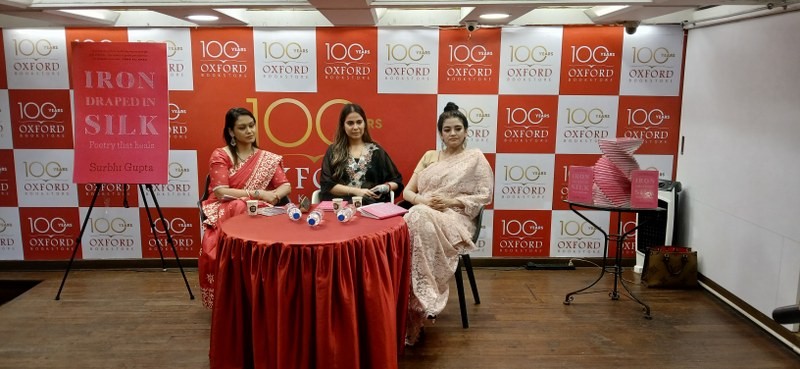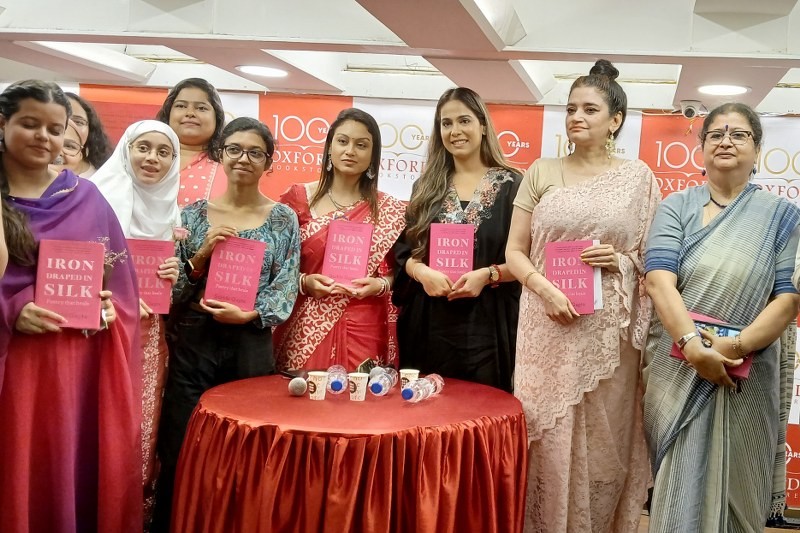To poet Surbhi Gupta, women are like Iron Draped In Silk

“Do you know what the earth is made of?” asked Surbhi Gupta of her audience gathered at Kolkata’s iconic Oxford Bookstore one July evening. “It is made of iron deep within its core/yet it produces the softest flowers and the prettiest colours…,” she explained in verse.
And that is how she defines women, said Gupta.
Speaking at the Kolkata launch of her debut book of poems titled ‘Iron Draped In Silk’, Surbhi Gupta said she believes women are born with the inherent quality to nurture and heal, just like Mother Earth, no matter how soft or delicate she is.
The unveiling of the book’s cover was followed by an interesting conversation between the author, book blogger and research scientist Dr. Deotima Sarkar, and dancer and scholar, and visiting faculty at international institutions Sohini Roychowdhury, where they discussed the origin of the book, its title, and the message for the readers.
Although her initial compositions were themed on ‘triggering notes’, Gupta said she soon abandoned the idea.
“I was only repeating what others have already written before me,” she said.

So she cut off herself from the electronic world and took leave of all the ‘screens’ around her and engaged in self-reflection.
Drawing inspiration from nature, she went back to her writing, and decided her poems would be ‘an inward journey illustrating how aligning with the rhythms of nature allows one to rediscover their strength, wisdom, and nurturing spirit’.
Divided into four sections, the book of poems encompasses the essence of womanhood as seen by the author.
According to Dr Sarkar, the book encompasses Gupta’s creative vision and healing words, a collection of poems which speaks softly yet powerfully.
“It [the book] is an invitation to explore the delicate balance of strength and vulnerability, to discover how our deepest scars can become threads of beauty when woven with honesty and grace,” said Sarkar.
Praising the author for emphasising on the fact that a woman should be her own self, Roychowdhury said that women should stop conforming to what other people think of them or want them to be.
“Why be a poor copy of someone who does not suit you,” said Roychowdhury. “It is like telling the lotus to be a rose, or a daffodil to be a lily. Be who you are, your core is sacred.”
According to Surbhi Gupta, the book was like a letter to herself, reminding herself of the ancient values, which we often tend to forget in the course of our life.
Said Gupta, “As women we have forgotten our strength, forget about telling it to society. We need to feel strong from within. We do not need to seek validation from the outside world. Strength is not about shouting or putting forward your point loudly. Strength is about realising the inherent power to give birth, to nurture, to grow, and to heal.”
Dr Sarkar also pointed out an interesting aspect of the book’s layout, its journaling format—the book not only ended with a few blank pages for readers to note down their thoughts but also there were a lot of blank spaces on every page alongside the poem.
According to Gupta, she wanted to follow the journaling format because she wanted her readers to interact with the pomes, write down what came to their mind as they were reading the poem.
A round of question and answer session followed the engrossing half an hour of conversation, with the programme concluding with a sumptuous tea offered by the bookstore.
(Text and images by Uttara Gangopadhyay)



